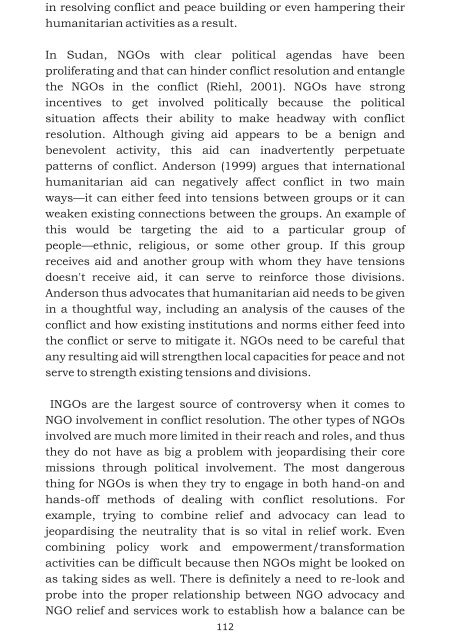Beneficiaries are actors too.pdf - Southern Institute of Peace ...
Beneficiaries are actors too.pdf - Southern Institute of Peace ...
Beneficiaries are actors too.pdf - Southern Institute of Peace ...
Create successful ePaper yourself
Turn your PDF publications into a flip-book with our unique Google optimized e-Paper software.
in resolving conflict and peace building or even hampering their<br />
humanitarian activities as a result.<br />
In Sudan, NGOs with clear political agendas have been<br />
proliferating and that can hinder conflict resolution and entangle<br />
the NGOs in the conflict (Riehl, 2001). NGOs have strong<br />
incentives to get involved politically because the political<br />
situation affects their ability to make headway with conflict<br />
resolution. Although giving aid appears to be a benign and<br />
benevolent activity, this aid can inadvertently perpetuate<br />
patterns <strong>of</strong> conflict. Anderson (1999) argues that international<br />
humanitarian aid can negatively affect conflict in two main<br />
ways—it can either feed into tensions between groups or it can<br />
weaken existing connections between the groups. An example <strong>of</strong><br />
this would be targeting the aid to a particular group <strong>of</strong><br />
people—ethnic, religious, or some other group. If this group<br />
receives aid and another group with whom they have tensions<br />
doesn't receive aid, it can serve to reinforce those divisions.<br />
Anderson thus advocates that humanitarian aid needs to be given<br />
in a thoughtful way, including an analysis <strong>of</strong> the causes <strong>of</strong> the<br />
conflict and how existing institutions and norms either feed into<br />
the conflict or serve to mitigate it. NGOs need to be c<strong>are</strong>ful that<br />
any resulting aid will strengthen local capacities for peace and not<br />
serve to strength existing tensions and divisions.<br />
INGOs <strong>are</strong> the largest source <strong>of</strong> controversy when it comes to<br />
NGO involvement in conflict resolution. The other types <strong>of</strong> NGOs<br />
involved <strong>are</strong> much more limited in their reach and roles, and thus<br />
they do not have as big a problem with jeopardising their core<br />
missions through political involvement. The most dangerous<br />
thing for NGOs is when they try to engage in both hand-on and<br />
hands-<strong>of</strong>f methods <strong>of</strong> dealing with conflict resolutions. For<br />
example, trying to combine relief and advocacy can lead to<br />
jeopardising the neutrality that is so vital in relief work. Even<br />
combining policy work and empowerment/transformation<br />
activities can be difficult because then NGOs might be looked on<br />
as taking sides as well. There is definitely a need to re-look and<br />
probe into the proper relationship between NGO advocacy and<br />
NGO relief and services work to establish how a balance can be<br />
112


